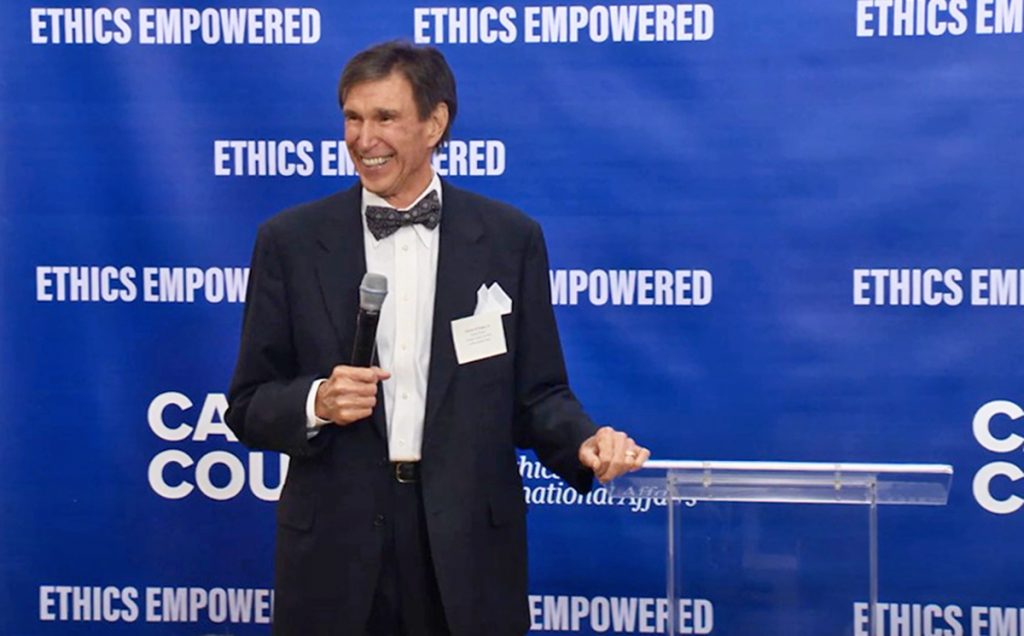
A well-known scholar and retired University of South Carolina professor who, until recently, resided in Blythewood, has been recognized for his endowment of an annual lecture series. Now retired, he has some thoughts to offer on his life’s work, international ethics and the lecture series.
“The motivation was to try to make the world a safer place and a saner place,” said Charles Kegley, Jr. of his long career, which began even before his 1971 Ph.D. graduation. “That’s what international ethics is all about: How do you do it …what are the precipitating factors that bring about wars – the causes of wars – and what are the preconditions for peace?”
Over the decades, Kegley says, he’s written 60 books and published more than 100 articles. Among those are various editions of his textbooks, which have become standard reading at colleges in the U.S. and globally.
“He has lectured here at Carnegie Council [for Ethics in International Affairs] on multiple occasions, at dozens of U.S. Universities, and around the world,” said his longtime protégé, Steve Hibbard, introducing the first of Kegley’s annual lecture series at the century-old New York-based think tank. Hibbard then rattled off an impressive list of global cities where Kegley has lectured.
“His books on world politics and foreign policy, adopted at one time at roughly 60 percent of the colleges in the U.S. – not to mention numerous overseas institutions – have educated thousands. They have helped shape and expand the worldview of generations of students.”
Kegley, nearly 80, says that while the lecture series is endowed in his will, the council decided to go ahead and get it started so that he could be present for the first lecture. He has long been involved with the organization and has previously served in leadership roles.
Kegley, the son of two scholars, is the second Charles Kegley to be both celebrated for his academic work and part of the council, a foreign policy think tank descended from an early 20th-century religious organization aimed at promoting world peace. His father, Charles Kegley Sr., was also honored as an intellectual heavyweight in his field.
Kegley spent his early years in the Chicago area and grew up in Columbus, Ohio. After graduating with his Ph.D. from Syracuse University in 1971, he says, he taught at Georgetown University for a year before USC offered him a job. By then he’d already published his first two books.
“They promised me a place where I’d have time to write, and they kept that promise – and I never regretted it,” he says of his decision to accept the position and move to South Carolina, where he went on to spend a 34-year career.
Kegley says he has turned down lucrative endowed chair offers from Rutgers University and Rice University because South Carolina – and Blythewood – had become his home, he says.
“I was at the university as department chair for five years, and I am very proud of what we became. Some people thought we were [among] the top five programs for the production of PhDs in the world,” he said.
The department Kegley chaired was then called Government and International Studies; it’s now known as Political Science.
It was giving the first lecture at California’s Kegley Institute for Ethics – an institution named in honor of his father following his death in 1986 – that Kegley first caught the attention of the Carnegie Council – and began what would turn into many years on the lecture circuit. In 1992, he says, he got out of administration at the university but continued writing and lecturing.
“The standard joke is that ethics and international affairs is an oxymoron,” he says of his field – because, allegedly, in the relationships among nations, there is no ethics. But he says he begs to differ.
Among the core concepts that he presented in his writings is the idea that setting boundaries in international relations allows for a kind of enlightened self-interest that benefits all – noting importantly that countries with democratic governments never wage aggression directly against one another.
A wise nation, he says, will recognize the value of having boundaries on international behavior.
As for U.S. foreign policy, he says the country should return to its roots in the 14 points of Wilsonian idealism, the principles used by former U.S. President Woodrow Wilson in negotiating peace after World War I.
“John Quincy Adams warned: Do not go abroad for monsters to destroy,” Kegley said, paraphrasing the former U.S. President. “Preserve our democracies and pray for other countries to endow their citizens with freedom…. Unfortunately, we have a bunch of warriors who want to impose the American way of life on others and benefit from aggression.”
After living more than 20 years in Cobblestone Park, Kegley and his wife Debbie recently downsized to Columbia and now split their time between the Columbia area and Wytheville, Va., where Kegley has ancestral ties.
He says the lifestyle his father showed him years ago was part of what prompted him to follow in his footsteps as a scholar – but, ultimately, he hopes that he’s also made a positive impact on the world.
“[My father] said there are different ways to earn a living, but if you can write and you have something to say, it seemed like an honorable life,” Kegley says. “To try to expand knowledge and educate people; it’s our only hope. Learning is the only antidote, really, for war.”











